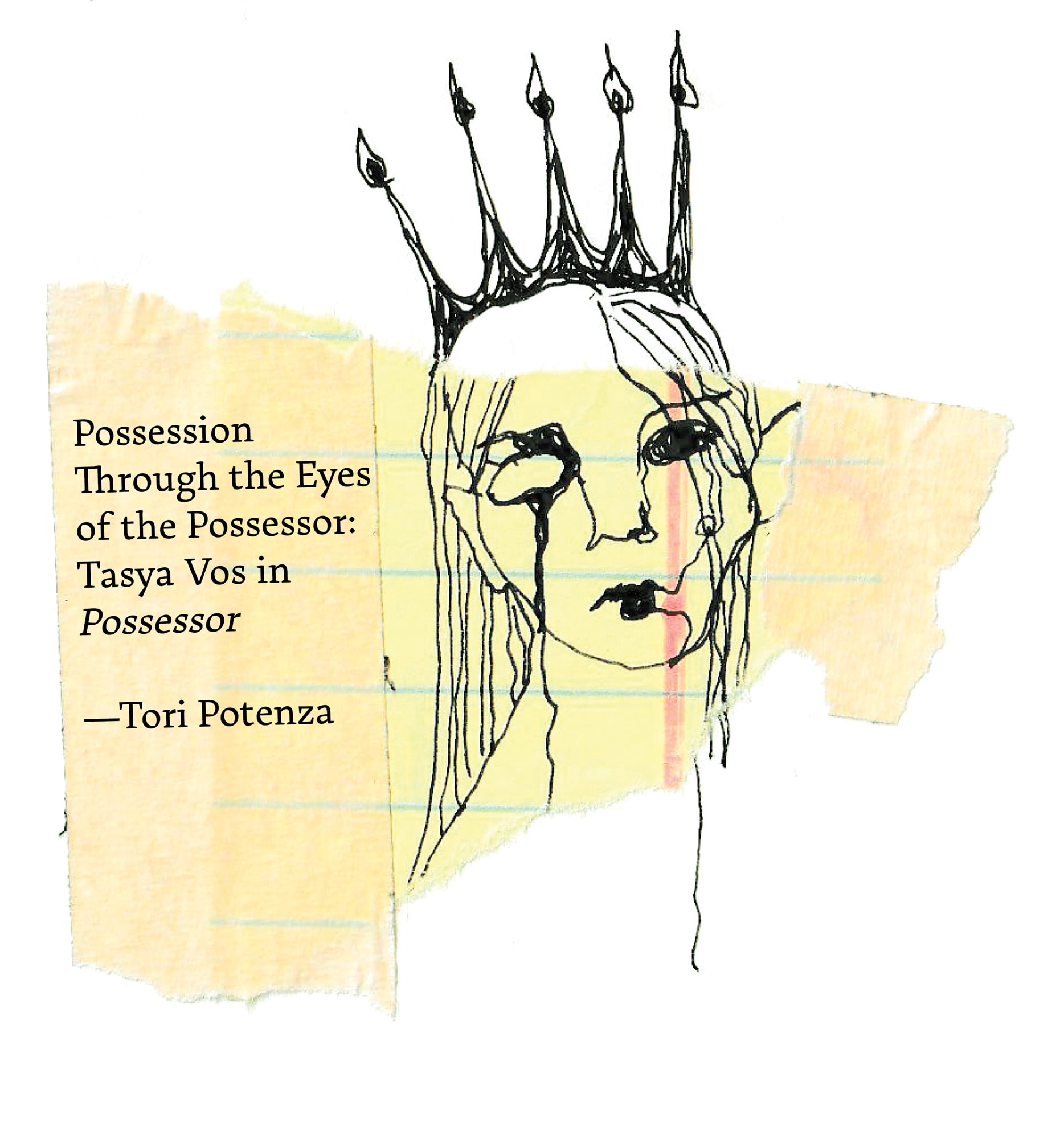Possession Through the Eyes of the Possessor: Tasya Vos in Possessor

The idea of possession can be found throughout history, across cultures. Every continent has stories and folklore about different kinds of possession. In the West, many of these stories focus on the Christian idea of demonic possession. Possession has been a ripe plot device for religious horror with many films dedicated to possession and exorcism. So, it is particularly interesting to see movies that delve into different kinds of possession. Brandon Cronenberg presented a unique take on the possession story in his 2020 film Possessor by rethinking the idea of who the “possessor” is. As opposed to a malevolent otherworldly presence taking over someone’s body, it is simply another person; a person who brings along their own array of history, anxieties, fears, and emotions. As such, Possessor uses possession as a storytelling device to bring forth questions about the psyche, human nature, and identity.
Possessor takes place in a world not so different from our own, where any claim to privacy has all but disappeared. Tasya Vos (Andrea Riseborough) works for a company that carries out corporate espionage for high paying clients. With brain implant technology, her company is able to send their agents into another person’s body in order to carry out assassinations. In this world “possession” is something that can be achieved with technology, and utilized for monetary gain. Vos is tasked with the job of possessing others for the needs of her company. Vos’s consistent use of this technology has profound effects on her and those she possesses. She cannot seem to “pull the trigger,” finding it increasingly difficult to kill her host body and return to her own. Her boss, Girder (Jennifer Jason Leigh), continues to push Vos in the hopes that she will become her replacement. As Vos finds it increasingly unbearable to live her own life, she forces herself to take a high profile job. She is tasked with executing a powerful CEO and his daughter, John and Ava Parse (Sean Bean and Tuppence Middleton), and possesses the body of Ava’s fiance Colin Tate (Christopher Abbott). But while in Tate’s body, Vos struggles to maintain control, and the two fight over the body they share.
By the time we meet Tasya, she has already made a name for herself as an assassin. We don’t get a snapshot of what Tasya was like before the technology, so as an audience, we do not know what changes have already occurred. Instead, we meet her at a point where her reactions to the act of possession are hitting a breaking point. Her struggle to come back to her body and fully complete the job are closely tied to the relationship she has with her estranged family. While the reason for the estrangement is not explicitly spoken, it is clear that it centers around Tasya and her job. In a half-hearted attempt to reconnect with them, she decides to take time off of work before her next assignment, but from the beginning it is clear that being with her husband and son is more alien to her than her mentally transient life. We see this when she stands in front of her home and has to figure out how to “act” like a loving wife and mother by practicing what to say and how to say it. She doesn’t know how to have a meaningful connection with them anymore and is inundated with violent fantasies as she spends time there. Whether tucking her son into bed or attempting to make love to her husband, she can’t stop thinking about violence. By the time her first day at home has come to an end she is already begging to go back to work.
For Tasya there is something addictive about the process of possessing. She does not seem to care about the money or power that comes with it. When she is in a different body every experience is different, and it offers her the opportunity to do things she could not do in her own body. In the opening scene of the film, she possesses a young woman at a bar, and she is hyper aware of everything around her. She literally gets to see the world through new eyes with every new body she is in. She also gets to experience death, without actually dying. She pulls the trigger and wakes up in her own body, which is scarier to her than the death itself. Her issues with getting “pulled out” of the host body are largely to do with her fear of having to be herself again. It is hard to say she empathizes with the people she possesses, considering the lack of remorse she shows for what she does to them. However, over the course of the film, she begins to truly take on their identities, more naturally than her own. She is possessed by those she is possessing. This becomes clear when she possesses Colin Tate and spends time in his body. When having sex with his fiancé, she visualizes herself there with his penis. It is clear that she likes taking on the traits and physical attributes of her hosts. When she plays the part of Colin, she is more convincing as the frustrated fiancé than she is when talking with her own family. Being other people ultimately frees her from the constraints of her own life.
As she spends more time in Tate’s body their “neurolink” weakens and their psyches begin to melt into one another. Brandon Cronenberg finds fascinating ways to show what this process looks and feels like with his use of light, reflections, and depth of frames. These visual cues help to explain the deep connection and fusion of the two as they become one. After a while it is not always clear who is in control or who is doing what. But the two begin merging together, having unfettered access to each other’s minds. Strangely enough, by the end of the movie, Colin might know Tasya better than anyone. While holding a gun to her husband’s head he says, “Have you ever thought of your wife as a predator?” This clues us into his understanding of the woman invading his mind and body. And for Tasya, this experience makes her more herself. When Tasya kills Colin’s fiancé, she gets an opportunity to practice killing someone she “loves.” She savors that moment before ending Ava’s life. While Colin is ultimately no match for Tasya and Girder, pieces of him will always be a part of Tasya.
There are also details that allude to another kind of possession. Tasya has a toxic relationship with her boss Girder. Girder pushes Tasya to be fully committed to her job and continuously encourages Tasya to leave her family behind. When Tasya mentions she wants to take time off to spend with her family, Girder is unable to hide her displeasure. She manipulates Tasya, even lying to her. She continuously mentions Taysa taking over for her, and how she sees Tasya in herself. There is the suggestion that Girder is planting false memories in Tasya’s mind as an attempt to steer her into a more desirable path. Girder says, “You have a special nature, one we’ve worked to unlock.” It is easy to wonder if Tasya was always this cold blooded killer, or if she was turned into this person by Girder. As mentioned, we don’t know what Tasya was like before this job, but given her relationship with her family, it is clear that she has changed significantly. There is a moment in the beginning of the movie when Tasya’s son shows her his robot toy and explains that he can program it to do whatever he wants. This signals the control that Girder and the corporation have over Tasya.
Colin offers insight into this at the end of the film while talking to Tasya’s husband:
Just think, one day your wife is cleaning the cat litter and she gets a worm in her, and that worm ends up in her brain. The next thing that happens is she gets an idea in there, too. And it’s hard to say whether that idea is really hers or it’s just the worm. And it makes her do certain things. Predator things. Eventually, you realize that she isn’t the same person anymore. She’s not the person that she used to be. It’s gotta make you wonder, whether you’re really married to her… or married to the worm.
This quote can be read twofold: Tasya as the worm in Colin’s body, and Girder in Tasya’s mind. Girder worms her way into Tasya’s mind and turns her into someone entirely different. In the final moments of the movie Tasya looks at her husband and says, “I loved him too, but I don’t know if that was really me.” While this alludes to her evolution into a new person, it also suggests that this change was facilitated by Girder’s fixation on splitting up Tasya’s family life. Girder makes the call to keep Taysa in Colin’s body even though it poses great risks. If anything, she sees this as an opportunity to get Tasya right where she wants her and remove any obstacles she thinks are holding Tasya back. Even if some of these changes are natural for Tasya, it is clear that through manipulation, emotional abuse, and the possession technology, she is molding Tasya into the person she wants.
A turning point in the movie is Tasya’s recognition that the only way to move forward in her life is to kill her past self, and those attachments she has to it. She experiences no remorse, guilt, or grief when she sees the dead bodies of her husband and son around her. She is now at peace, able to return to her own body because she does not have to be a wife and mother. Tate’s body acted as a cocoon for her metamorphosis. Whether she was pushed into this by Girder, or wanted it for herself, is up for debate. Yet we can assume that her anxieties and trouble completing her jobs are something she has overcome through this process. The movie even plays her lack of remorse as a triumphant moment for her character.
While Possessor is largely a critique of late stage capitalist society and power-hungry Amazon-esque conglomerates, its themes around identity are what make it a fascinating piece to return to. Using possession as a way to explore these ideas is also a unique take on the trope itself. As opposed to demons or spirits, a person possessing another person allows us to think of the concept in a more philosophical way. Through the possession process, Tasya finds a fascinating way to experience the world. With this technology, she is able to see the world and ultimately learn about herself. While it ultimately leads to her being more set in her ways as a killer, there is something inspirational about someone coming into their true self. And in the world Brandon Cronenberg has created in Possessor, being someone else might be the only way for someone to come into their own.
Tori (she/they) is a queer writer, historian, horror academic, and body horror enthusiast. You can find their writing at MovieJawn, Slay Away With Us, Cul-de-Sac of Blood, and Hear Us Scream.
Twitter: theneonbanshee
Instagram: theneonbanshee
Letterboxd: Tori Potenza
